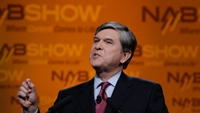Smith reminds audience that broadcasting remains vital, relevant during keynote

NAB CEO Gordon Smith sought to boost the spirits of broadcasters besieged by FCC efforts to recoup 120MHz of spectrum from over-the-air TV stations April 12 during his State of the Industry keynote speech opening the 2010 NAB Show.
Smith, who took the reins of the association in September 2009, reminded those in attendance that “broadcasting’s vitality and reason for being” are far from distant memories. “The values that underpin broadcasting are still essential to the American people and to our democracy,” he said.
Reminding his audience that free radio and TV remain relevant and vital, Smith branded broadcasting as “the original wireless technology” and said broadcasters are adopting new technologies and finding “new ways to deliver the most popular and important content.”
A major focus of Smith’s speech was the FCC’s National Broadband Plan presented to Congress in mid-March. Smith questioned whether the commission would actually restrain its efforts to take back TV spectrum, especially if the measures outlined in the plan failed to produce enough broadcasters willing to relinquish their slice of spectrum voluntarily. “To put it simply, this spectrum reallocation is bad for consumers and bad for broadcasters,” Smith said. “It's not voluntary as originally advertised.”
Smith reminded his audience that consumers and broadcasters alike have spent billions of dollars to make the transition to DTV a success. Reallocating TV spectrum for broadband use without first completing an inventory of all spectrum that could identify more suitable candidates would be ill-advised, he said.
The NAB CEO pointed to the vital role the broadcast industry plays during times of emergency and said harvesting broadcast spectrum for wireless Internet use could ultimately leave some citizens exposed to harmful circumstance for lack of adequate warning.
“Make no mistake: This matter is one of homeland security,” he said. “During times of emergencies, there is no way that cell phone and broadband networks will ever be as reliable as broadcasting in terms of delivering timely and accurate information to the masses.”
Get the TV Tech Newsletter
The professional video industry's #1 source for news, trends and product and tech information. Sign up below.
Smith also addressed the contentious issue of retransmission consent and told his audience that together with its TV network partners, the NAB is working with policymakers to help them see that “the fair and market-based retransmission consent process is working just as Congress intended.”
